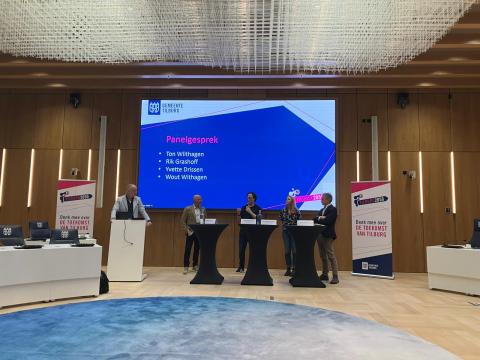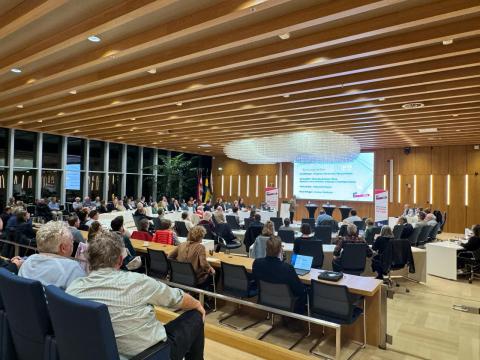Blog: Building a Tilburg that works
On Wednesday evening, March 20, a lecture and panel discussion on broad prosperity and the labor market took place in the council chamber of Tilburg City Hall. This was the third meeting within the Tilburg 2050 series on the future of the city.
Ton Wilthagen, professor of Labor Market, was the evening's keynote speaker. The panel also included Wout Withagen ("the tame branch" of Wilthagen, he joked), Yvette Drissen, and Rik Grashoff. Citizens from the region were welcome to exchange ideas in an imaginative way about Tilburg's labor market in 2050. Yvette Drissen, philosopher and post-doctoral researcher at the Academic Collaborative Center for an Inclusive Labor Markets, reports on the evening.
Imagination is a muscle you can exercise
During Ton Wilthagen's lecture, this muscle was fully activated among the younger as well as the older audience members. Full of enthusiasm, he sketched a futuristic view in which 50+ people would run the 10 miles of Tilburg. At the same time, Wilthagen had both feet firmly planted in reality. We are currently dealing with a strongly aging population. There is a shortage in the labor market, but at the same time, we also face an inclusion shortage. Digitalization and artificial intelligence offer opportunities but also cause our jobs to change. We are running into planetary limits; our way of working needs to be made sustainable. "Tilburg 2050 has long since begun," calling on the municipality to provide direction as a guardian of broad prosperity.
Panel discussion
What do you get when you put an entrepreneur, alderman, philosopher, and full professor together? This sounds like the beginning of a joke. Yet the panel—consisting of entrepreneur Wout Withagen, alderman Rik Grashoff, philosopher Yvette Drissen, and full professor Ton Wilthagen—engaged in a serious discussion with the members of the audience. How do they envision the labor market of 2050? And what are they up against now?
After a round of introductions, Alderman Grashoff kicked off the discussion: how can we engage those thousands of Tilburg citizens who are currently "deep in the card-index box" in the job market? In response, skills passports were discussed, with Wout Withagen emphasizing the role of the gig economy. A member of the audience shared his insights about a housing project in Tilburg North that involves the neighborhood. Another member, no less than 84 years old, suggested much greater facilitation of refugee participation in the labor market.
"It's hard to predict the future, but we can try to imagine the future."
- Ton Wilthagen
Students were left with questions and doubts. One of them recognized himself in the idea of the rat race, a phenomenon that Yvette Drissen pointed out. In the pursuit of that prestigious job in the Randstad, it is no longer enough to have a Master's degree and a year as a board member; everyone already has that. More is needed to attract attention. This student preferred to stay in Tilburg and do meaningful work, preferably on a volunteer basis. How do you keep people who want to make a difference here? Wout Withagen offered perspective and talked about the opportunities in Tilburg for impactful work. His company Freshheads is a great example of this. Another student was actually curious about the future of Tilburg as an international student city, to which Alderman Grashoff replied that these students are very welcome. He did acknowledge, however, that there are challenges in terms of housing.
One member of the audience indicated that he is close to retirement. Given the state of the labor market, he is now unsure whether he would be better off continuing in his current job for longer or volunteering in a field where there are shortages. "What should I choose?" Another member of the audience questioned the notion of "work.” What about unpaid work such as informal care duties and child care; work that often remains invisible but crucial to keeping society running? Yvette Drissen added that part-time work in the Netherlands also exposes gender differences. For now, figures from CBS show that mainly women start working part time after the arrival of the first child and take on care duties, while the men continue to work full time.
The last question was about how we can also design the labor market in an ecological way. This immediately formed a nice bridge to the next lecture, which will focus on the theme of sustainability. This will take place on April 17.


From imagination to image
Our imagination was also immediately made visual. During the meeting, two artists actively drew along with what was being said. They drew a huge picture with a futuristic inner city, robots, skills passports, persons at work, rainbows, the municipality as a sheep farmer, and much more. An inclusive labor market, I can really see it.
More information about Tilburg 2050 and the lecture series can be found here. (in Dutch).
Text by Yvette Drissen. Drawing by 'Getekend Verslag'.

Ton Wilthagen is professor of Institutional and Legal Aspects of the Labor Market and one of the academic leads of the Academic Collaborative Center for an Inclusive Labor Market at Tilburg University.
Wout Withagen is director of Freshheads, a digital service agency focused on developing innovative digital services that make the greatest possible positive impact.
Yvette Drissen is a postdoc within the Academic Collaborative Center for an Inclusive Labor Market and lectures ethics and political philosophy at Tilburg University.
Rik Grashoff is a GroenLinks alderman in Tilburg and holds the portfolio of Public Space, Mobility, Education, and Labor Participation.
